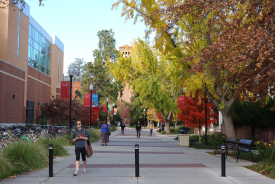Activist Professors at Columbia and Barnard Under Fire for Alleged Mishandling of Free Speech Issues
ByIn the wake of numerous battles over the boundaries of free expression, particularly regarding issues of antisemitism and anti-Zionism, a controversy has erupted at Barnard College and Columbia University.
Departmental Statements Under Scrutiny
The removal of the "Statement of Palestinian Solidarity" from the website of Barnard's department of women, gender, and sexuality studies (DWGSS) sparked criticism from faculty members and civil liberties groups. Critics argue that such actions threaten academic freedom.
Janet Jakobsen, a former director of the Barnard Center for Research on Women, expressed concern about the prevailing conditions of academic freedom at Barnard. She questioned whether the college genuinely upholds principles of free expression.
Moreover, the New York Civil Liberties Union denounced Barnard's actions as incompatible with a sound understanding of academic freedom. In response to the removal of the statement, the DWGSS took matters into their own hands by launching a separate website, showcasing their solidarity with Palestine.
Debate over Academic Freedom and Institutional Neutrality
The removal of the statement has ignited a broader debate over the role of academic departments in endorsing political viewpoints. Some argue for institutional neutrality, asserting that departments should refrain from promoting specific ideological agendas to safeguard academic freedom.
However, proponents of the DWGSS statement defend their right to express solidarity with Palestine. They contend that academic departments have a responsibility to engage in political discourse and advocate for social justice issues.
Yet, the controversy underscores the need for clarity regarding academic freedom and institutional neutrality. While individual faculty members should have the liberty to express their views, departments must uphold principles of neutrality to ensure a diverse and inclusive academic environment.
Institutional neutrality would prevent the marginalization of dissenting voices and promote intellectual diversity within academic institutions. It would also signal to students that their perspectives are valued, regardless of their political beliefs.
The debate over academic freedom extends beyond Barnard and Columbia to universities nationwide. Recent controversies have highlighted the challenges of navigating free expression in an increasingly polarized society.
Ultimately, the resolution of this dispute will shape the future of academic discourse and the preservation of free expression on college campuses. It is imperative for institutions to uphold principles of academic freedom while fostering an environment conducive to intellectual exchange and debate.
The controversy at Barnard and Columbia reflects broader tensions surrounding free speech and academic freedom. As universities grapple with these issues, they must strike a balance between promoting diverse perspectives and maintaining institutional neutrality. Only then can they fulfill their mission of fostering critical inquiry and intellectual growth.
© 2025 University Herald, All rights reserved. Do not reproduce without permission.








